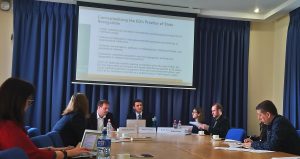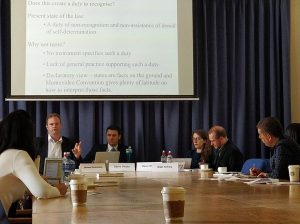 IICRR hosted a conference on “Secession and Recognition of States in the Twenty First Century” at DCU Glasnevin Campus on Friday 18th May. The conference examined the central role that the recognition of states plays in shaping global politics. Recognition of new states is loaded with political and legal controversies, which can affect international stability, normative and legal order, and reshuffle geopolitical relations between states and alliances. To explore this important topic, this conference discussed secession and recognition of states in the contemporary world politics with leading international scholars.
IICRR hosted a conference on “Secession and Recognition of States in the Twenty First Century” at DCU Glasnevin Campus on Friday 18th May. The conference examined the central role that the recognition of states plays in shaping global politics. Recognition of new states is loaded with political and legal controversies, which can affect international stability, normative and legal order, and reshuffle geopolitical relations between states and alliances. To explore this important topic, this conference discussed secession and recognition of states in the contemporary world politics with leading international scholars.
A keynote lecture was delivered by Professor Mikulas Fabry of Georgia Institute of Technology, who discussed the evolution of state recognition in theory and practice. Professor James Summers of Lancaster University examined how particular pathways to independence determine prospects for recognition. Professor Jure Vidmar of Manchester University explored the collective recognition of states in legal theory and practice. Dr Gëzim Visoka of Dublin City University, presented his joint research with Professor Edward Newman of the University of Leeds on the EU’s practice of state recognition to shed light on the role of regional organisations in recognition of new states, Dr Dawn Walsh of University College Dublin presented on territorial self-government as a conflict management tool.
 In the afternoon session, Professor James Ker-Lindsay of St Mary’s University, Twickenham London delivered a talk on the strategy of parent states against the recognition of break-away regions. Professor Bruno Coppieters from Vrije University Brussels examined the pragmatic policy of engagement without recognition, while Dr Chiara Loda of DCU examined breakaway regions and state recognition through the case of Georgia. Finally, Prof John Doyle and Prof Eileen Connolly of DCU presented on state recognition and reorganisation in a European context through the cases of Brexit, Irish unity, Scotland and Catalonia, S Mr Muhamet Brajshori from Kosovo’s Ministry of Foreign Affairs presented his view on Kosovo’s strategy for diplomatic recognition, while Dr Yaser Alashqar of Trinity College Dublin discussed Palestine’s struggle for international recognition.
In the afternoon session, Professor James Ker-Lindsay of St Mary’s University, Twickenham London delivered a talk on the strategy of parent states against the recognition of break-away regions. Professor Bruno Coppieters from Vrije University Brussels examined the pragmatic policy of engagement without recognition, while Dr Chiara Loda of DCU examined breakaway regions and state recognition through the case of Georgia. Finally, Prof John Doyle and Prof Eileen Connolly of DCU presented on state recognition and reorganisation in a European context through the cases of Brexit, Irish unity, Scotland and Catalonia, S Mr Muhamet Brajshori from Kosovo’s Ministry of Foreign Affairs presented his view on Kosovo’s strategy for diplomatic recognition, while Dr Yaser Alashqar of Trinity College Dublin discussed Palestine’s struggle for international recognition.
The presentations provoked in-depth, engaging discussion and helped advance the study of this area.


